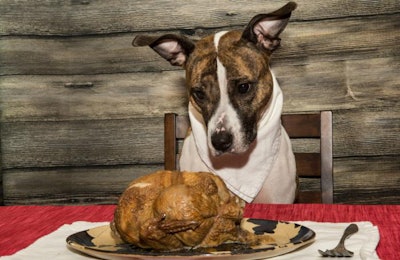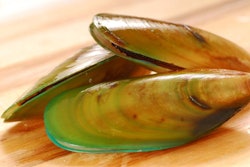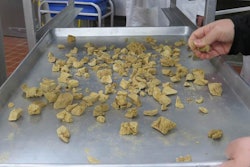
Classic Thanksgiving ingredients sometimes appear in dog and cat food formulations. Ingredients such as turkey and cranberries can provide companion animals with protein, antioxidants and other nutrients. Here, we examine four Thanksgiving-themed ingredients and their merits in pet food formulations.
1. Turkey
Pet food buyers tend to project their own perceptions of turkey as a healthy meat onto pet foods that contain this lean protein source, said Aldrich. The turkey meat used as a pet food ingredient is virtually identical to that used in hot dog production, so the nutrient information is relatively similar.
2. Sweet potatoes
Another human health food trend that has moved into pet food is sweet potatoes. Sweet potatoes became the "darling carb" of human health food, and subsequently have become increasingly popular in specialty pet foods, wrote Aldrich. For example, sweet potatoes can now be found in elimination diets for the treatment of pet food allergies, as an ingredient in no-grain and raw formulas, and as a novelty in boutique and ultra-premium pet foods. Sweet potatoes provide beta-carotene, vitamins, dietary fiber and haven't been associated with any known allergic reactions in dogs and cats.
3. Cranberries
Cranberries contain antioxidants and have been used to fortify pet foods with those chemicals, an in pet foods that appeal to owners looking for added fruits and vegetables, said Aldrich. Cranberries have also been used in pet foods marketed with urinary tract health claims. However, little published research backs-up or refutes the claim that cranberries fight urinary tract in infections in cats or dogs.
4. Pecans and other tree nuts
Like cranberries, little scientific evidence exists either for or against the use of tree nuts, such as pecans, almonds or cashews, in pet food from the perspectives of nutrition, palatability or processing. Aldrich noted there is little to no record of tree nut toxicity in pets, but also almost no dog or cat feeding studies to review. From a marketing perspective, Aldrich suggested that tree nuts might be a good alternative carbohydrate and protein source.
Learn more about pet food ingredients in the Petfood Industry Knowledge Center, a collection of premium content for pet food industry professionals. This library contains 100 articles by nutritionist Greg Aldrich, PhD, associate professor at Kansas State University, published in Petfood Industry since 2005.














